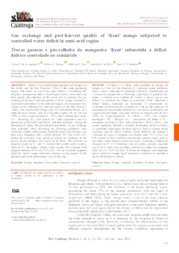Gas exchange and post-harvest quality of Kent mango subjected to controlled water deficit in semi-arid region.
Gas exchange and post-harvest quality of Kent mango subjected to controlled water deficit in semi-arid region.
Autoria: ANDRADE, V. P. M. de; SIMOES, W. L.; DIAS, N. da S.; SILVA, J. S. da; BARBOSA, K. V. F.
Resumo: Brazil is the seventh largest producer of mangoes in the world, and the São Francisco Valley is the main producing region, with ?Kent? as one of the main cultivars. Considering that irrigation management affects physiological events, production and fruit quality, the objective of this work was to evaluate the gas exchange in the leaves and fruit quality of ?Kent? mango subjected to controlled water deficit in the semi-arid region. The experiment was carried out in Petrolina-PE, semi-arid region of the São Francisco Valley. The experimental design used was randomized blocks, in a triple factorial scheme, with four irrigation depths (40, 60, 80 and 100% of crop evapotranspiration - ETc), three phenological stages (F1 - flowering, F2 - fruit growth, F3 - fruit maturation) and two production cycles (2018 and 2019), with four replicates. During the phenological stages, the physiological parameters of gas exchange were evaluated. After harvesting, the following parameters were evaluated: soluble solids content, titratable acidity, pH, firmness and peel color. Irrigation with a depth between 79.5 and 83.6% ETc during the evaluated stages promoted greater gas exchange in the leaves, greater firmness and acidity in the fruits. The reduction in irrigation depth in F1 and F3 reduced the soluble solids content, while in F2 the highest soluble solids content was obtained with irrigation between 68.24 and 74.5% ETc. The most suitable irrigation depth for ?Kent? mango cultivation depends on the purpose of the producer and on the phenological stage of the crop.
Ano de publicação: 2023
Tipo de publicação: Artigo de periódico
Unidade: Embrapa Semiárido
Observações
1 - Por padrão são exibidas publicações dos últimos 20 anos. Para encontrar publicações mais antigas, configure o filtro ano de publicação, colocando o ano a partir do qual você deseja encontrar publicações. O filtro está na coluna da esquerda na busca acima.
2 - Para ler algumas publicações da Embrapa (apenas as que estão em formato ePub), é necessário ter, no celular ou computador, um desses softwares gratuitos. Sistemas Android: Google Play Livros; IOS: iBooks; Windows e Linux: software Calibre.
Acesse outras publicações
Acesse a Base de Dados da Pesquisa Agropecuária (BDPA) para consultar o acervo completo das bibliotecas da Embrapa.

